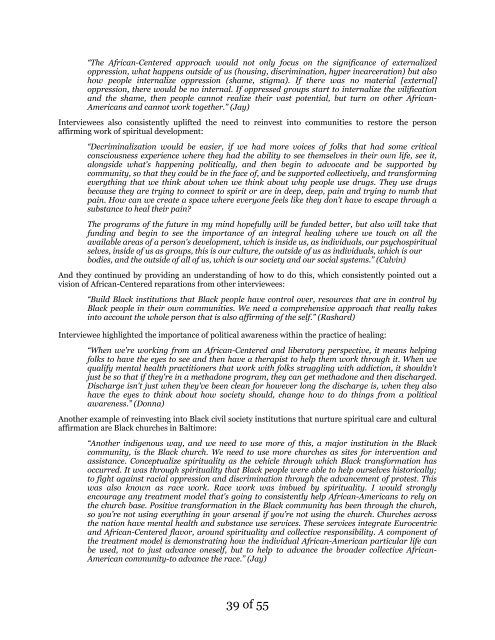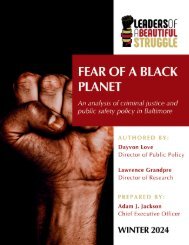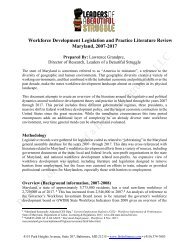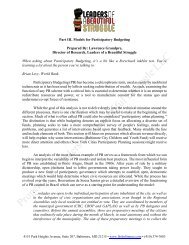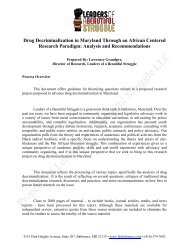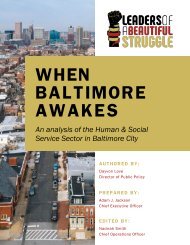The Communal Impacts of Drug Criminalization in Maryland
This project attempts to reframe the harms of drug criminalization. Influenced by African-Centered Research Methodologies, we engaged in a literature review and qualitative research of the communal impacts of drug decriminalization in Maryland, with a specific focus on Baltimore.
This project attempts to reframe the harms of drug criminalization. Influenced by African-Centered Research Methodologies, we engaged in a literature review and qualitative research of the communal impacts of drug decriminalization in Maryland, with a specific focus on Baltimore.
You also want an ePaper? Increase the reach of your titles
YUMPU automatically turns print PDFs into web optimized ePapers that Google loves.
“<strong>The</strong> African-Centered approach would not only focus on the significance <strong>of</strong> externalized<br />
oppression, what happens outside <strong>of</strong> us (hous<strong>in</strong>g, discrim<strong>in</strong>ation, hyper <strong>in</strong>carceration) but also<br />
how people <strong>in</strong>ternalize oppression (shame, stigma). If there was no material [external]<br />
oppression, there would be no <strong>in</strong>ternal. If oppressed groups start to <strong>in</strong>ternalize the vilification<br />
and the shame, then people cannot realize their vast potential, but turn on other African-<br />
Americans and cannot work together.” (Jay)<br />
Interviewees also consistently uplifted the need to re<strong>in</strong>vest <strong>in</strong>to communities to restore the person<br />
affirm<strong>in</strong>g work <strong>of</strong> spiritual development:<br />
“Decrim<strong>in</strong>alization would be easier, if we had more voices <strong>of</strong> folks that had some critical<br />
consciousness experience where they had the ability to see themselves <strong>in</strong> their own life, see it,<br />
alongside what's happen<strong>in</strong>g politically, and then beg<strong>in</strong> to advocate and be supported by<br />
community, so that they could be <strong>in</strong> the face <strong>of</strong>, and be supported collectively, and transform<strong>in</strong>g<br />
everyth<strong>in</strong>g that we th<strong>in</strong>k about when we th<strong>in</strong>k about why people use drugs. <strong>The</strong>y use drugs<br />
because they are try<strong>in</strong>g to connect to spirit or are <strong>in</strong> deep, deep, pa<strong>in</strong> and try<strong>in</strong>g to numb that<br />
pa<strong>in</strong>. How can we create a space where everyone feels like they don’t have to escape through a<br />
substance to heal their pa<strong>in</strong>?<br />
<strong>The</strong> programs <strong>of</strong> the future <strong>in</strong> my m<strong>in</strong>d hopefully will be funded better, but also will take that<br />
fund<strong>in</strong>g and beg<strong>in</strong> to see the importance <strong>of</strong> an <strong>in</strong>tegral heal<strong>in</strong>g where we touch on all the<br />
available areas <strong>of</strong> a person's development, which is <strong>in</strong>side us, as <strong>in</strong>dividuals, our psychospiritual<br />
selves, <strong>in</strong>side <strong>of</strong> us as groups, this is our culture, the outside <strong>of</strong> us as <strong>in</strong>dividuals, which is our<br />
bodies, and the outside <strong>of</strong> all <strong>of</strong> us, which is our society and our social systems.” (Calv<strong>in</strong>)<br />
And they cont<strong>in</strong>ued by provid<strong>in</strong>g an understand<strong>in</strong>g <strong>of</strong> how to do this, which consistently po<strong>in</strong>ted out a<br />
vision <strong>of</strong> African-Centered reparations from other <strong>in</strong>terviewees:<br />
“Build Black <strong>in</strong>stitutions that Black people have control over, resources that are <strong>in</strong> control by<br />
Black people <strong>in</strong> their own communities. We need a comprehensive approach that really takes<br />
<strong>in</strong>to account the whole person that is also affirm<strong>in</strong>g <strong>of</strong> the self.” (Rashard)<br />
Interviewee highlighted the importance <strong>of</strong> political awareness with<strong>in</strong> the practice <strong>of</strong> heal<strong>in</strong>g:<br />
“When we're work<strong>in</strong>g from an African-Centered and liberatory perspective, it means help<strong>in</strong>g<br />
folks to have the eyes to see and then have a therapist to help them work through it. When we<br />
qualify mental health practitioners that work with folks struggl<strong>in</strong>g with addiction, it shouldn't<br />
just be so that if they're <strong>in</strong> a methadone program, they can get methadone and then discharged.<br />
Discharge isn't just when they've been clean for however long the discharge is, when they also<br />
have the eyes to th<strong>in</strong>k about how society should, change how to do th<strong>in</strong>gs from a political<br />
awareness.” (Donna)<br />
Another example <strong>of</strong> re<strong>in</strong>vest<strong>in</strong>g <strong>in</strong>to Black civil society <strong>in</strong>stitutions that nurture spiritual care and cultural<br />
affirmation are Black churches <strong>in</strong> Baltimore:<br />
“Another <strong>in</strong>digenous way, and we need to use more <strong>of</strong> this, a major <strong>in</strong>stitution <strong>in</strong> the Black<br />
community, is the Black church. We need to use more churches as sites for <strong>in</strong>tervention and<br />
assistance. Conceptualize spirituality as the vehicle through which Black transformation has<br />
occurred. It was through spirituality that Black people were able to help ourselves historically;<br />
to fight aga<strong>in</strong>st racial oppression and discrim<strong>in</strong>ation through the advancement <strong>of</strong> protest. This<br />
was also known as race work. Race work was imbued by spirituality. I would strongly<br />
encourage any treatment model that's go<strong>in</strong>g to consistently help African-Americans to rely on<br />
the church base. Positive transformation <strong>in</strong> the Black community has been through the church,<br />
so you’re not us<strong>in</strong>g everyth<strong>in</strong>g <strong>in</strong> your arsenal if you’re not us<strong>in</strong>g the church. Churches across<br />
the nation have mental health and substance use services. <strong>The</strong>se services <strong>in</strong>tegrate Eurocentric<br />
and African-Centered flavor, around spirituality and collective responsibility. A component <strong>of</strong><br />
the treatment model is demonstrat<strong>in</strong>g how the <strong>in</strong>dividual African-American particular life can<br />
be used, not to just advance oneself, but to help to advance the broader collective African-<br />
American community-to advance the race.” (Jay)<br />
39 <strong>of</strong> 55


